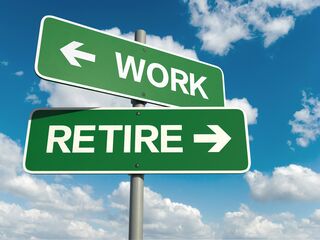Aging
Will Leaving Work Help People Find New Meaning in Life?
New scientific evidence shows retirement increases sense of purpose in life.
Posted December 9, 2021 Reviewed by Michelle Quirk
Key points
- Work is typically considered an essential source of meaning and purpose in life.
- Leaving work could imply a decline in meaning in life, but it could also offer opportunities to engage in more meaningful activities.
- The boost in purpose upon retirement is mostly driven by lower-socioeconomic-status adults and occurs within the four years after retirement.

During the pandemic, many people reported reevaluating where they find meaning in their lives. For some, these reflections seem to have resulted in them quitting their jobs or retiring, initiating one of the most interesting economic stories of the pandemic, "The Great Resignation."
The human search for meaning is strongly intertwined with our relationship to work. In 2018, 4,867 adults on the American Trends Panel responded to an open-ended question about what makes their lives meaningful. The top source of meaning according to this assessment was family, with 69 percent mentioning family in their responses to the question. This was followed by 34 percent who mentioned their careers as a source of meaning in their lives.
Work organizes our lives; it gives us short-term goals such as preparing for the next meeting or long-term goals such as advancing our careers. Work surrounds us with people and helps us play our part in making our societies function and improve. According to Gallup data, since the 1990s, 55 percent of workers in the United States consistently report deriving a sense of identity from their jobs as opposed to viewing their jobs as something they do for a living.
My coauthors and I were intrigued by these statistics and wanted to know more about how involvement with work shapes the meaning people find in their lives. To explore this question, we tested how people's sense of purpose in life changes upon retirement, one of the most important life transitions, which involves substantial withdrawal from work.
Below is a summary of the findings from our paper, which was published in Psychological Science and coauthored with Nattavudh Powdhtavee from Warwick Business School and Ashley Whillans from Harvard Business School.
Background
Existing evidence on retirement and sense of purpose in life showed a negative relationship between the two that supported a path to existential ennui upon retirement. It suggested that losing the roles, goals, and structure from work initiated aimlessness and lowered meaning.
The problem was that existing evidence was only correlational, so we could not confidently infer that these associations represented the causal impact of retirement. It was possible that the correlations were driven by the opposite pathway, whereby a decline in purpose induces the decision to retire.
The correlations could also be picking up the effects of a third factor that could not be measured and controlled for in the analysis. For instance, illness or bereavement could cause people to retire while at the same time reducing their sense of purpose in life, which could create the appearance of a negative relationship between retirement and sense of purpose.
New Evidence
In our study, we revisited these findings to identify the causal impact of retirement in a longitudinal data set of 8,113 American adults surveyed over eight years.
We used a quasi-experimental method from economics called instrumental variable analysis. Our methodology took advantage of an external factor that could not be determined by the variables studied but will cause a shift in our predictor variable of interest (retirement) so that we can measure how this shift affects our outcome (sense of purpose in life). The so-called "instrument" we used was the age at which people become eligible for receiving their retirement benefits in the United States as per the Social Security retirement benefits.
Entering this age caused a significant jump in the probability of retirement in the population and we found a sizable increase in sense of purpose in life as a result of this retirement activity (.29 standard deviations).
Lower Socioeconomic Status
In additional analysis, we also examined "who" drove this positive effect, and we found that those who retired in response to government incentives were more likely to have lower income and education, and they were dissatisfied in their jobs. They did not differ from others in terms of their baseline sense of purpose in life or health.
Given the strong link between time use and well-being, we also explored how activities people engaged in changed upon retirement and found an increase in time spent with grandchildren and other social activities such as playing games. These exploratory analyses showed that, as people decrease the time they spend at work, they may begin to spend time in other meaningful activities that would boost their well-being.
Length of Positive Effect
Retirement theories have previously mentioned the possibility of a "honeymoon effect" in which people would feel euphoric shortly after retirement, although it has been unclear how long this effect would last. We were curious if the effects uncovered in our study would also demonstrate this predicted trajectory of an initial jump followed by a decline.
Consistent with the "honeymoon effect," we found the positive changes in sense of purpose in life to be significant and more precise during the first four years after retirement. We did not find a negative effect between four and eight years—but the estimates were not statistically significant.
The size of the coefficient was still positive and somewhat close to the main estimates in magnitude (.20 standard deviations), but there was more variability in the estimates, suggesting that, at the longer time horizons, certain groups may begin to show deteriorations in meaning and purpose in life.
Implications
Our research suggests that thinking about work as an inherently meaningful activity may be misleading. The socioeconomic factors can make nonwork activities more meaningful than work especially when they undermine people's abilities to choose the jobs that they like. Perhaps these findings can explain why the Great Resignation was mostly driven by low-wage workers seeking better jobs or older adults retiring early.
Our findings are consistent with some of the trends observed in the previously mentioned survey from the American Trends Panel where only 22 to 24 percent of lower-income people with no college education mentioned their career or jobs as what makes their lives meaningful, which is less than the 48 percent of the high-income and college-educated people who referred to their jobs as a source of meaning.
Similarly, in the Gallup data cited before, only 45 percent of those who don’t hold a college degree derive a sense of identity from their jobs versus 70 percent of the college-educated adults. Altogether, these findings show that opportunities to derive meaning and satisfaction from work are not distributed equally.
Relatedly, these findings help us understand broader health and well-being outcomes among at-risk populations and the role of work-related policies and individual decisions in determining these outcomes. Sense of purpose in life arises from having goals and activities that give meaning to life; therefore, it predicts a productive engagement with life, better health outcomes, reduced risk of disease, and longevity.
Our findings imply that retirement may initiate a positive trajectory of health and well-being, especially among disadvantaged groups. Furthermore, policies that delay retirement may negatively impact the health and well-being of vulnerable groups, at least for a period of time.
References
Yemiscigil, A., Whillans, A., Powdthavee, N. (2021). The Effects of Retirement on Sense of Purpose in Life: Crisis or Opportunity? Psychological Science. https://journals.sagepub.com/doi/full/10.1177/09567976211024248
Yemiscigil, A., & Vlaev, I. (2021). The bidirectional relationship between sense of purpose in life and physical activity: a longitudinal study. Journal of Behavioral Medicine, 1–11. https://link.springer.com/article/10.1007/s10865-021-00220-2
Giurge, L., Whillans, A., Yemiscigil, A. (2021). A Multicountry Perspective on Gender Differences in Time Use During COVID-19. Proceedings of the National Academy of Sciences. https://www.pnas.org/content/118/12/e2018494118
Pew Research Center. (2018). Where Americans Find Meaning in Life. https://www.pewforum.org/2018/11/20/where-americans-find-meaning-in-lif…
Gallup. (2014). In U.S., 55% of Workers Get Sense of Identity From Their Job. https://news.gallup.com/poll/175400/workers-sense-identity-job.aspx
Thompson, D. (2021). Three Myths of the Great Resignation. https://www.theatlantic.com/ideas/archive/2021/12/great-resignation-myt…
Dhingra, Samo, Schaninger, Schrimper. (2021). Help your employees find purpose—or watch them leave. https://www.mckinsey.com/business-functions/people-and-organizational-p…




